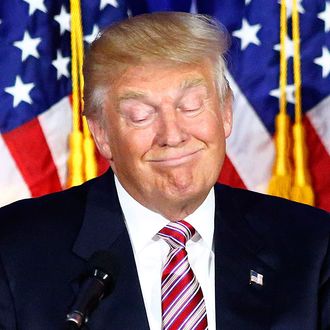
Donald Trump entered Tuesday night having spent more than a week arguing with reporters, his campaign staff, and, eventually, damn near every elected official in his party about what can and cannot be inferred from a federal judge’s “Mexican heritage.” Even as his own aides tried to shift “the conversation” away from the candidate’s musings on which races are most capable of judging him impartially, Trump insisted that his surrogates take the fight to the real racists in the D.C. press corps. The mogul started losing Republican endorsements. Reporters wondered aloud if it was too late for an Establishment coup. Paul Ryan used the “R-word.” And Mitch McConnell ordered the GOP nominee “to get on message.”
At some point Tuesday afternoon, the backlash hit home. Trump offered no apology for his controversial remarks, but promised to stop making them. That evening, the nominee celebrated his final state-primary victories by reading a speech off a teleprompter and never once saying the words “Trump University” or “Mexican judge.”
“I understand the responsibility of carrying the mantle and I will never, ever let you down,” Trump said, in a line directed at his party’s leadership. “I will make you proud of your party and our movement.”
Trump was back on message. But that message was very much his own and not that of the Republican Establishment. He described his campaign’s first principle as “America first,” then defined it as a rejection of hawkish foreign policy:
It’s important to understand what “America first” means. It means on foreign policy, we will never enter into any conflict unless it makes us safer as a nation. It has to make us safer as a nation. This is the opposite of Hillary’s foreign policy, which invaded Libya, destabilized Iraq, unleashed ISIS, and threw Syria into chaos, and created the mass migration, which is wreaking havoc all over the world.
There’s little reason to think that Trump has any genuine convictions about American foreign policy. But he appears to see political utility in loudly rejecting the interventionist orthodoxies of both parties. When Republicans blame Middle East instability on Democrats, they’re supposed to cite Obama’s abandonment of Iraq — not the decision to invade it in the first place. (It’s true that Trump takes his party’s line on the Iran deal, but that position seems to be motivated mostly by the fact that the policy was negotiated by Obama and has the word deal in it.)
Similarly, Trump rebuked his party’s policy consensus — by way of rebuking Clinton — on matters of trade, reiterating his opposition to NAFTA, TPP, and all other agreements that fail to put “America first.” At one point, Trump made his independence from the GOP explicit, arguing that “this election isn’t about Republican or Democrat, it’s about who runs this country. The special interests or the people.”
Nonetheless, Trump provided plenty of red meat to traditional red voters, vowing to expand oil production, cut taxes and regulations, and, above all, tell the world the shocking truth about that kleptocratic demon couple named “the Clintons.”
Considering the shape Trump 2016 was in before the teleprompter started rolling, the speech was a success. No ethnic groups were disparaged, no fellow Republicans insulted. Trump looked and sounded, more or less, like a presidential candidate.
Some pundits have argued that in sticking to a script, Trump sacrificed the very things that got him to this point: his charisma and aura of authenticity. And it’s true that when Trump reads off a monitor — instead of joyously improvising — his platitudes sound more conspicuously vapid, his similes more confusing. When delivered in a stilted cadence, “You’re going to see some real good things happen” sounds less defiantly vague than awkwardly so. And “Our jobs are being stripped from our country like we’re babies” raises more questions (Do babies have jobs? Do people “strip” babies?) when it isn’t spouted as part of a swaggering back-and-forth with a raucous crowd.
But concerns about whether a “kinder, gentler” Trump will alienate his base are beside the point. The mogul can’t win the White House with his base alone, and his campaign isn’t going to win anybody else by continuing to allow an eccentric, deeply misogynistic 69-year-old billionaire with racist instincts, if not beliefs, to vent his stream of consciousness into every microphone that’s put in front of him. A stilted but disciplined Trump, who incessantly reminds Republicans that they hate Hillary Clinton — and independents that they’re unhappy with the post-recession recovery — has a much better chance of becoming president than the “charismatic” Trump of the past few weeks.
Which is why the least boring moment of the mogul’s address was also its most alarming (or relieving, depending on one’s partisan loyalties): In the middle of Trump’s diatribe on trade, a supporter shouted “No TPP.” The candidate replied, “No PPP. You’re right about that.” For a second, it looked like Trump had realized that he’d misspoken — that the supporter was objecting to the Trans-Pacific Partnership, not Public Policy Polling — and was about to correct himself.
“And you mean,” Trump began, “no pee-pee.”
No pee-pee.
The GOP nominee didn’t alienate any supporters by equating the TPP to urine. But an ad-libbed toilet joke isn’t the best way for a candidate to beat back charges of immaturity. And if Trump couldn’t quite stay on message for a full 40 minutes, it’s hard to see him charting a straight and narrow path from here to November.






























